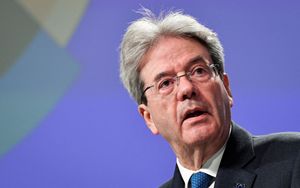(Finance) – “The Green Deal it is one of the main legacies of the current European Commission, and the right thing for the next Commission to do will be to “stay the course” and push forward with its implementation. But Huge public and private funding will be neededand constant attention to the fairness of the redistributive effects of the transition, or to its impact in terms of social justice”. This is essentially what the EU Commissioner for Economy, Paolo Gentiloni, stated in his speech at the “EU Sustainable Investment Summit 2024”, entitled “Completing the green transition”.
“We are entering – said Gentiloni – the final phase of a mandate in which Europe’s boat has been rocked by unprecedented crises. But despite everything, we have maintained the course of the Green Deal as the EU’s new growth strategy”. And “this strategy recognized from the beginning that the green transition cannot happen without the necessary funding“. When asked whether public or private funding is more important, the answer “is that we need both”, noted the commissioner.
“We need public investment to help attract private capital and compensate for market failures. And we need private investment to achieve the necessary scale. The green transition requires specific investments of such magnitude that public financing alone cannot will never be enough. In the EU, we indicate the figure of 520 billion euros of additional investments per year until the end of the decade. Globally, we’re talking about trillions.”
“During this mandate” of the Commission “we have adopted several innovative initiatives to mobilize sustainable investments”, recalled Gentiloni. “With new instruments such as the Recovery and Resilience Fund (which finances the NRPs, ed.) and the InvestEU programme, we have put almost €500 billion on the table for the green transition until 2027. This is good news, and We are encouraging Member States to make the most of all the tools and funding we have made available, starting with the determined implementation of their Recovery and Resilience Plans.”
“Achieving the green transition – underlined the commissioner – is an environmental necessity, an economic opportunity and a geopolitical imperative. It requires, as we have seen, investments on an unprecedented scale. But it also requires – warned Gentiloni – broad acceptability We must be aware of the possible redistributive effects of our policies. And we must ensure that the transition is truly just, that efforts are shared equitably and that workers have the skills they need. Our success or failure on this front does not it is only a moral question, it is also a ‘sine qua non’ for the transition itself to be successful. And the next elections are also a timely reminder in this sense.” “The European Green Deal – continued the commissioner – is one of the main legacies of this Commission. It will be up to the next Commission to take it forward. Staying on course on the Green Deal is the right thing to do, as long as we balance long-term ambition with pragmatism and common sense. If we do this, I am convinced that Europe will be able to preserve its global leadership in driving the green transition”, concluded Gentiloni.
